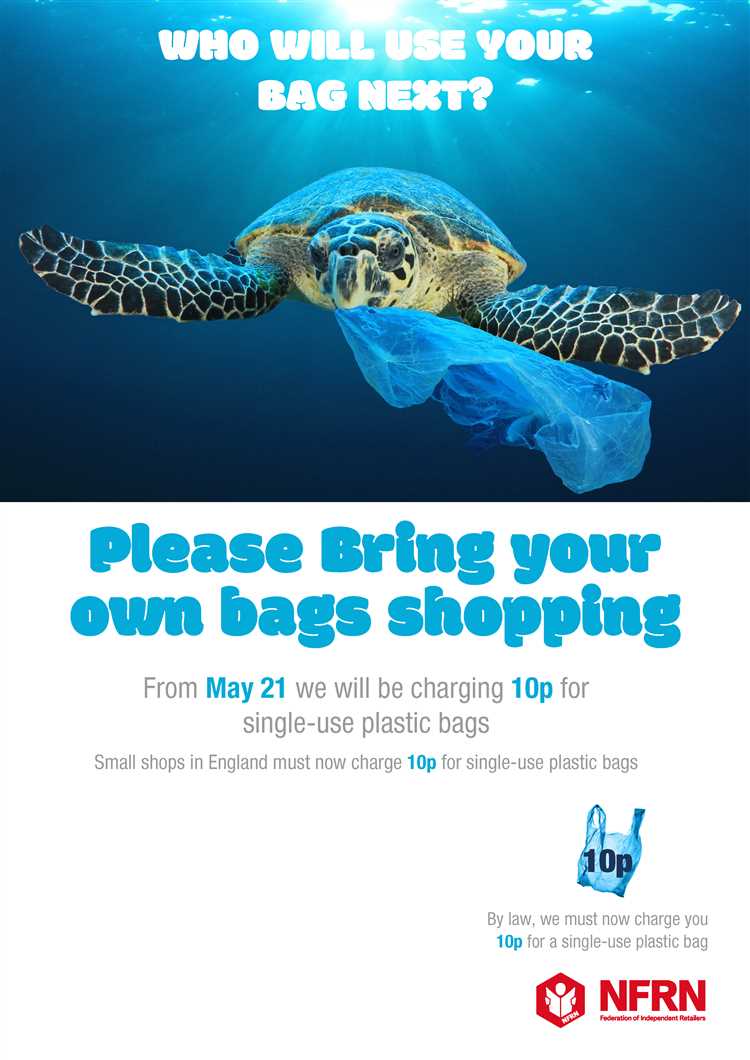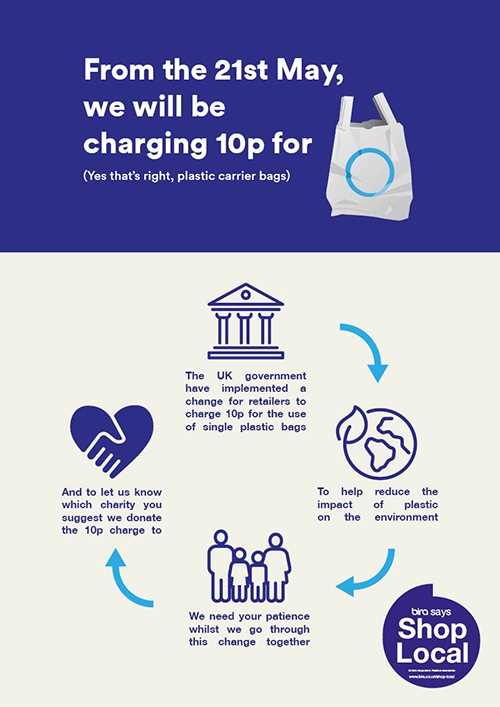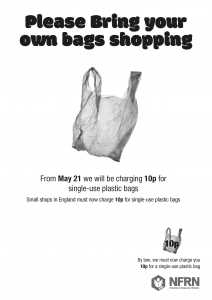In recent years, there has been a growing global awareness about the environmental impact of plastic waste. Plastic bags, in particular, have become a symbol of this ongoing issue. To tackle the problem, numerous countries and regions have implemented policies to reduce the usage of plastic bags, including the introduction of a charge per bag.
The 10p charge for plastic bags has been a hotly debated topic, with arguments for and against it. This article aims to shed light on the reasons behind this charge and the impact it has on the environment and society. By understanding the rationale behind this policy, we can make informed decisions and contribute to a greener future.
First and foremost, the 10p charge serves as a deterrent to discourage the excessive usage of plastic bags. When a financial cost is attached to something previously provided for free, people tend to become more conscious of their actions. By making consumers think twice before taking a plastic bag, the charge encourages them to consider alternative options, such as reusable bags or carrying items without a bag.
Furthermore, the 10p charge for plastic bags helps to reduce plastic waste and its harmful effects on wildlife and ecosystems. Plastic bags are notorious for their long lifespan and resistance to decomposition, often polluting waterways and endangering marine life. By imposing a charge, consumers are more likely to reuse bags, leading to a decrease in the number of plastic bags entering the environment and causing harm.
Another important aspect to consider is the financial benefit that the 10p charge brings. The revenue generated from this charge can be used to support environmental initiatives and projects aimed at tackling plastic waste. By reallocating funds to activities such as recycling programs or educational campaigns, the charge contributes to the development of a more sustainable society.
To conclude, the 10p charge for plastic bags serves multiple purposes, including discouraging excessive usage, reducing plastic waste, and providing financial support for environmental initiatives. By understanding the reasoning behind this charge, we can actively participate in efforts to protect the environment and move towards a greener future.
- Reasons for the 10p Charge for Plastic Bags
- Background and History of the Plastic Bag Charge
- Economic and Environmental Impact of Plastic Bags
- Growing Awareness of Single-Use Plastic Pollution
- Question-answer:
- Why is there a 10p charge for plastic bags?
- How is the 10p charge for plastic bags beneficial?
- Are there any exceptions to the 10p charge for plastic bags?
- What impact has the 10p charge had on plastic bag usage?
Reasons for the 10p Charge for Plastic Bags

There are several important reasons why a 10p charge has been introduced for plastic bags:
- Environmental Impact: Plastic bags pose a significant threat to the environment. They are not biodegradable and can take hundreds of years to break down. When they do eventually break down, they release harmful chemicals into the soil and water, causing pollution and endangering wildlife.
- Reduce Plastic Waste: By charging for plastic bags, it encourages people to bring their own reusable bags when shopping. This will help reduce the amount of plastic waste generated and ultimately decrease the demand for plastic bag production.
- Conservation of Resources: The production of plastic bags requires significant amounts of natural resources, including fossil fuels and water. By reducing the usage of plastic bags, we can conserve these resources and promote sustainable practices.
- Financial Incentive: The charge for plastic bags serves as a financial incentive for consumers to change their behavior. By making the bags more costly, it encourages people to use reusable alternatives, which are better for the environment in the long run.
- Funding Environmental Initiatives: The revenue generated from the 10p charge can be used to fund environmental initiatives and support projects aimed at reducing plastic waste and promoting sustainable practices. This allows the government to invest in programs that have a positive impact on the environment.
In conclusion, the 10p charge for plastic bags has been implemented to address the environmental impact of plastic waste, reduce the usage and production of plastic bags, conserve natural resources, incentivize behavioral change, and fund environmental initiatives. Together, these reasons aim to create a more sustainable and environmentally friendly future.
Background and History of the Plastic Bag Charge
The introduction of the 10p charge for plastic bags in many countries around the world is a response to the growing concern over the environmental impact of single-use plastic bags. Plastic bags are notorious for their negative effects on the environment, as they contribute to litter, pollution, and harm wildlife.
The idea of charging for plastic bags emerged as a means to reduce their usage and encourage people to switch to more sustainable alternatives. The first country to implement a plastic bag charge was Denmark in 2003. They introduced a tax on all plastic bags in an effort to reduce the country’s reliance on disposable bags.
Since then, many other countries have followed suit and introduced similar charges. In the United Kingdom, the plastic bag charge was introduced in England in 2015, following successful implementations in Scotland, Wales, and Northern Ireland. The charge initially started at 5p per bag and was doubled to 10p in 2021 to further discourage the use of plastic bags.
The plastic bag charge has been successful in reducing plastic bag consumption across the globe. In the United Kingdom alone, there has been a significant decrease in plastic bag usage since the introduction of the charge. This has led to a positive environmental impact, including a reduction in plastic waste and marine pollution.
Furthermore, the revenue generated from the plastic bag charge is often used to fund environmental initiatives and projects. In the UK, a portion of the proceeds from the charge goes towards supporting charities and organizations that focus on environmental conservation and sustainability.
Overall, the plastic bag charge is an important step towards reducing plastic waste and protecting the environment. It not only encourages individuals to make more conscious decisions about their consumption habits but also supports initiatives that aim to preserve the planet for future generations.
Economic and Environmental Impact of Plastic Bags

Plastic bags have become a ubiquitous part of our daily lives, but their convenience comes at a cost. The economic and environmental impacts of plastic bags have become a subject of growing concern in recent years.
From an economic perspective, the production, distribution, and disposal of plastic bags require significant resources. The manufacturing of plastic bags involves the extraction of natural resources, such as oil or natural gas, which are non-renewable and finite. The production process also requires energy and water, further adding to the environmental footprint.
Furthermore, plastic bags are not durable and have a short lifespan. This means that they need to be constantly replaced, leading to a high demand and increased production. The costs associated with the production and distribution of plastic bags, including transportation and storage, are ultimately passed on to the consumers.
In contrast, the environmental impact of plastic bags is significant and long-lasting. Plastic bags are not biodegradable and can persist in the environment for hundreds of years. This leads to various negative consequences, such as litter, pollution, and harm to wildlife.
Plastic bags can easily become litter, especially in areas with inadequate waste management systems. They can end up in rivers, oceans, and forests, causing harm to marine life, animals, and ecosystems. Plastic bags can also clog drains and contribute to flooding during heavy rainfalls.
The consumption of plastic bags has a direct impact on the environment. According to studies, millions of barrels of oil are used each year to produce plastic bags globally. This increases greenhouse gas emissions, contributing to climate change and environmental degradation.
Efforts to mitigate the economic and environmental impact of plastic bags have led to the implementation of various measures, such as the 10p charge for plastic bags. This charge serves as an incentive to reduce their usage and promote reusable alternatives. By reducing the demand for plastic bags, we can conserve resources, decrease pollution, and protect the environment for future generations.
| Economic Impact | Environmental Impact |
|---|---|
|
|
Growing Awareness of Single-Use Plastic Pollution

Single-use plastic pollution has become a significant environmental concern in recent years. People are becoming more aware of the negative impacts that single-use plastics have on our planet, including the harm they cause to wildlife and the pollution of our oceans and landfills.
Plastic bags, in particular, have garnered attention due to their widespread use and disposal. These bags are typically used only once before being thrown away, contributing to the growing problem of plastic waste. The 10p charge for plastic bags aims to reduce their usage and encourage individuals to bring their own reusable bags when shopping.
With the increasing awareness of single-use plastic pollution, many individuals and organizations have taken action to address the issue. Environmental campaigns, such as “Plastic-Free July,” have gained traction and encouraged people to find alternatives to single-use plastics. Additionally, governments and businesses have implemented various initiatives to reduce plastic waste, such as banning certain plastic products or introducing more sustainable packaging options.
Education and outreach programs have also played a crucial role in raising awareness about single-use plastic pollution. Schools, community organizations, and environmental groups conduct campaigns and workshops to educate individuals about the environmental impact of plastic waste and promote sustainable practices.
Through these collective efforts, there is hope that we can combat the growing problem of single-use plastic pollution. By reducing our reliance on single-use plastics and adopting more sustainable alternatives, we can protect our environment and ensure a healthier future for generations to come.
Question-answer:
Why is there a 10p charge for plastic bags?
The 10p charge for plastic bags is implemented to discourage their use and promote eco-friendly alternatives. Plastic bags are harmful to the environment as they take hundreds of years to decompose and often end up in oceans, causing pollution and endangering marine life.
How is the 10p charge for plastic bags beneficial?
The 10p charge for plastic bags is beneficial in several ways. Firstly, it reduces the demand for plastic bags, which leads to a decrease in the production of such bags and conserves resources. Secondly, it encourages people to bring their own reusable bags, reducing waste and promoting sustainability. Lastly, the revenue generated from the charge can be used for environmental initiatives and projects.
Are there any exceptions to the 10p charge for plastic bags?
Yes, there are some exceptions to the 10p charge for plastic bags. Small or medium-sized businesses with fewer than 250 employees are exempt from the charge. Additionally, there are specific types of bags that are exempt, such as bags for raw meat, fish, prescription medicines, and unpackaged food. However, it is important to note that these exceptions vary depending on the region or country.
What impact has the 10p charge had on plastic bag usage?
The 10p charge for plastic bags has had a significant impact on reducing their usage. Studies have shown that since the introduction of the charge, the number of plastic bags distributed by retailers has decreased by over 80%. This demonstrates that the charge has been successful in changing consumer behavior and promoting the adoption of more sustainable alternatives.